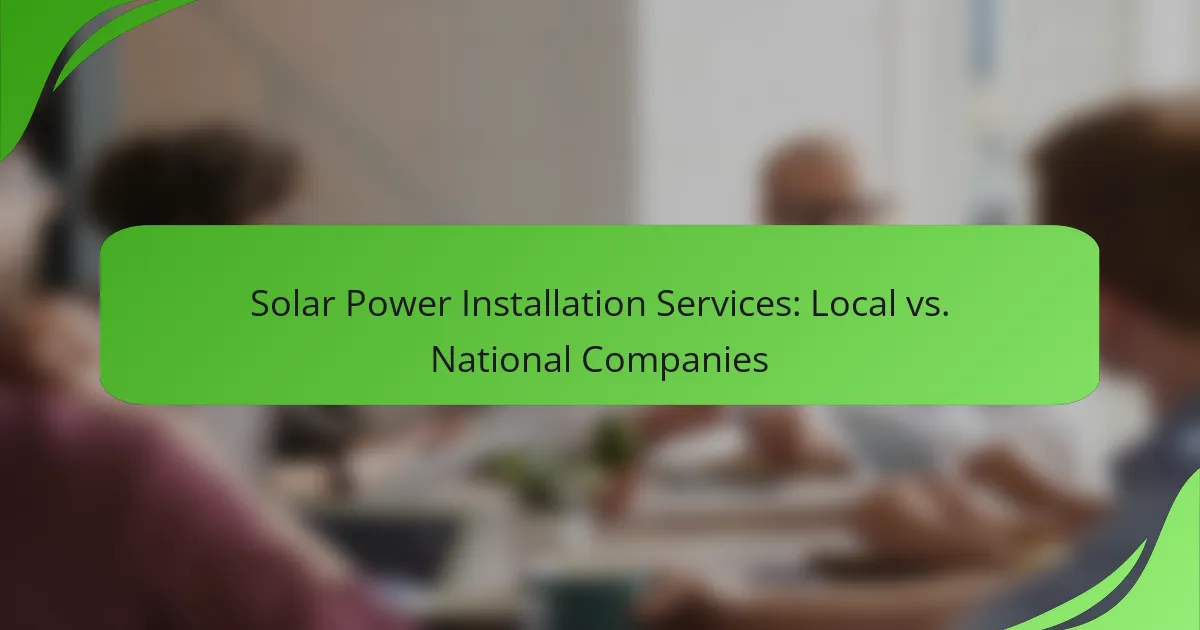When considering solar power installation services, it’s essential to weigh the benefits of local versus national companies. Local providers often deliver personalized support and a keen understanding of community needs, while national firms can offer extensive financing options and advanced technology. Each choice presents unique advantages that can significantly impact your solar experience and overall satisfaction.

What are the benefits of local solar power installation services?
Local solar power installation services offer distinct advantages, including personalized support and a deeper understanding of community needs. These companies are often more accessible and can provide tailored solutions that align with local regulations and conditions.
Personalized customer service
Local solar installers typically prioritize customer relationships, allowing for a more personalized approach. Clients can expect direct communication with the team, leading to tailored solutions that fit specific needs and preferences.
This level of service often results in a smoother installation process, as local companies are more likely to engage with customers throughout the project, addressing concerns and adjustments in real-time.
Faster response times
Local solar companies generally offer quicker response times compared to national firms. Being nearby means they can schedule consultations and installations more rapidly, often within days rather than weeks.
This immediacy can be crucial for customers eager to start saving on energy costs or those facing urgent installation needs due to home renovations or other factors.
Knowledge of local regulations
Local solar installers possess a thorough understanding of regional regulations and incentives, which can significantly impact the installation process. They are familiar with local permitting requirements, utility interconnection standards, and available tax credits or rebates.
This expertise can help streamline the installation process and ensure compliance, ultimately saving customers time and potential legal issues. Local knowledge also allows installers to recommend systems that best suit the specific climate and energy needs of the area.

What are the advantages of national solar power installation companies?
National solar power installation companies offer several advantages, including extensive financing options, a strong brand reputation, and access to cutting-edge technology. These benefits can make the process of going solar more accessible and efficient for homeowners and businesses alike.
Wider range of financing options
National companies typically provide a broader array of financing options compared to local firms. This can include various loan programs, leasing arrangements, and power purchase agreements (PPAs) that cater to different financial situations.
For example, some national installers may offer zero-down financing, allowing customers to install solar panels without upfront costs. This flexibility can make solar energy more attainable for a wider audience, especially those who may be hesitant due to initial expenses.
Established brand reputation
National solar power companies often have an established brand reputation, which can instill confidence in potential customers. Their experience in the industry usually translates to better customer service and reliability.
Choosing a well-known company can also provide peace of mind regarding warranty support and service continuity. Customers are more likely to trust a brand that has been in the market for several years and has a proven track record of successful installations.
Access to advanced technology
National solar installation companies frequently have access to the latest solar technologies and innovations. This can include high-efficiency solar panels, advanced inverters, and smart energy management systems that optimize energy use.
By leveraging these technologies, national companies can offer more efficient and effective solar solutions. Homeowners may benefit from improved energy savings and enhanced system performance, which can lead to a quicker return on investment.

How do local and national solar companies compare on pricing?
Local and national solar companies differ significantly in pricing strategies. Local firms may provide more competitive rates due to lower overhead costs, while national companies can leverage bulk purchasing to reduce material expenses.
Local companies may offer competitive rates
Local solar companies often have lower operational costs, which can translate into more affordable pricing for consumers. They may also be more flexible in negotiations, allowing for tailored financing options that suit individual budgets.
Additionally, local firms are typically more familiar with regional incentives and rebates, which can further reduce overall installation costs. For instance, a local company in Florida might help clients access state-specific tax credits, enhancing affordability.
National companies often have bulk purchasing power
National solar companies benefit from economies of scale, allowing them to purchase materials in bulk at reduced prices. This purchasing power can lead to lower costs for consumers, especially for larger installations.
However, while the initial pricing may be attractive, national firms might have less flexibility in terms of customization and customer service. Clients may find that local companies provide a more personalized experience, which can be valuable in navigating the installation process.

What factors should you consider when choosing a solar installation service?
When selecting a solar installation service, consider company experience, warranty options, and financing choices. These factors will help ensure you receive quality service and support throughout the installation process and beyond.
Company experience and reviews
Evaluate the experience of the solar installation company by checking how long they have been in business and their track record with previous projects. Look for customer reviews on platforms like Google, Yelp, or specialized solar review sites to gauge satisfaction levels.
Consider companies that have completed a significant number of installations in your area, as they are likely familiar with local regulations and climate conditions. A company with a strong reputation and positive feedback is more likely to provide reliable service.
Warranty and service agreements
Warranties are crucial when choosing a solar installation service, as they protect your investment. Look for companies that offer comprehensive warranties covering both equipment and labor, typically ranging from 10 to 25 years.
Service agreements should outline the maintenance and support you can expect after installation. Ensure you understand the terms, including any costs associated with service calls or repairs, to avoid surprises down the line.
Financing options available
Financing options can significantly impact your decision when choosing a solar installation service. Many companies offer various plans, including cash purchases, loans, leases, and power purchase agreements (PPAs). Each option has its pros and cons, so consider what aligns best with your financial situation.
Research available incentives, such as federal tax credits or local rebates, which can reduce the overall cost of your solar system. Understanding these financial aspects will help you make an informed choice and maximize your investment in solar energy.

How does the installation process differ between local and national companies?
The installation process for solar power systems can vary significantly between local and national companies. Local firms often emphasize personalized service and community engagement, while national companies typically rely on standardized methods to streamline their operations.
Local companies may provide more hands-on support
Local solar installation companies often prioritize customer relationships and provide tailored support throughout the installation process. This can include detailed consultations, site assessments, and ongoing communication, which can lead to a more customized solar solution that fits the specific needs of the homeowner.
Additionally, local firms may have a better understanding of regional regulations and incentives, which can help customers navigate available rebates or tax credits. This localized expertise can enhance the overall experience and potentially reduce installation costs.
National companies may have standardized procedures
National solar companies typically implement standardized procedures to ensure consistency and efficiency across multiple locations. This can lead to quicker installation times, as they often have established protocols for assessing properties and deploying teams.
However, this standardization may limit the flexibility to adapt to unique site conditions or customer preferences. While national companies may offer competitive pricing due to their scale, customers might miss out on the personalized service that local companies provide.

What are the common financing options for solar power installation?
Common financing options for solar power installation include cash purchases, solar loans, and leasing options. Each method has its own advantages and considerations, allowing homeowners to choose the best fit for their financial situation and energy goals.
Cash purchase
A cash purchase involves paying the full cost of the solar system upfront. This option allows homeowners to own their solar panels outright, leading to significant long-term savings on energy bills and potential tax incentives.
When considering a cash purchase, evaluate the total installation cost, which can range from several thousand to tens of thousands of dollars depending on system size and location. This method is ideal for those who have the available funds and want to maximize their return on investment.
Solar loans
Solar loans allow homeowners to finance their solar installation while retaining ownership of the system. Monthly payments are made over a set term, typically ranging from five to twenty years, and can be structured to match the savings on energy bills.
When exploring solar loans, compare interest rates and terms from various lenders. Look for options with low or no down payment requirements to minimize upfront costs. Be aware of any fees or penalties associated with early repayment.
Leasing options
Leasing options involve paying a monthly fee to use the solar system without owning it. This arrangement typically includes maintenance and monitoring services, making it a hassle-free choice for homeowners who prefer not to manage the system themselves.
While leasing can lower upfront costs, it may not provide the same long-term savings as ownership. Lease agreements usually last between 15 to 25 years, so consider the total cost over the lease term and the potential impact on property value when deciding if this option is right for you.

What are the local solar incentives available in your area?
Local solar incentives vary by region and can significantly reduce installation costs. These incentives may include tax credits, rebates, grants, and net metering policies that allow homeowners to sell excess energy back to the grid.
Tax Credits and Deductions
Many local governments offer tax credits or deductions for solar installations. For example, homeowners might receive a percentage of the installation cost back as a tax credit, which can help offset the initial investment. It’s essential to check your state’s specific offerings, as these can change frequently.
Rebates and Grants
Rebates are often provided by local utilities or state programs to encourage solar adoption. These can range from a few hundred to several thousand dollars, depending on the size of the system and local policies. Grants may also be available for low-income households or specific community projects, providing additional financial support.
Net Metering Policies
Net metering allows homeowners with solar panels to receive credits for the excess electricity they generate and send back to the grid. This can significantly lower monthly utility bills. Policies vary by state, so understanding your local net metering rules is crucial for maximizing savings.
Local Solar Programs
Some areas have specific solar programs designed to make solar energy more accessible. These programs might include community solar initiatives, where multiple households share a single solar installation, or financing options that allow homeowners to pay for their systems over time. Researching local programs can uncover additional savings opportunities.
